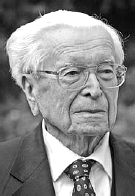Karl Lennert
Karl Lennert (1921–2012) was a prominent German pathologist known for his significant contributions to the field of hematopathology, particularly in the classification and understanding of lymphomas. His work has had a lasting impact on the diagnosis and treatment of hematologic malignancies.
Early Life and Education[edit | edit source]
Karl Lennert was born on June 2, 1921, in Fürth, Germany. He pursued his medical studies at the University of Munich and later at the University of Erlangen-Nuremberg, where he received his medical degree in 1945.
Career[edit | edit source]
Lennert began his career in pathology at the University of Kiel, where he worked under the mentorship of Arnold Lauche. He quickly developed an interest in hematopathology, focusing on the study of lymphoid tissues and diseases.
In 1967, Lennert was appointed as the head of the Department of Pathology at the University of Kiel, a position he held until his retirement in 1989. During his tenure, he established the Kiel Lymphoma Classification, which became a cornerstone in the field of lymphoma research and diagnosis.
Contributions to Hematopathology[edit | edit source]
Karl Lennert is best known for his work on the classification of lymphomas. The Kiel classification system, developed in the 1970s, was one of the first to categorize lymphomas based on their histological and immunological characteristics. This system laid the groundwork for the Revised European-American Lymphoma (REAL) classification and the subsequent World Health Organization (WHO) classification of lymphoid neoplasms.
Lennert's research also contributed to the understanding of T-cell lymphomas, a group of lymphoid malignancies that were poorly understood before his work. His studies on lymphadenopathy and the histopathology of lymphoid tissues have been widely cited and remain influential in the field.
Awards and Honors[edit | edit source]
Throughout his career, Karl Lennert received numerous awards and honors for his contributions to medicine and pathology. These include the Rudolf Virchow Prize and the Robert Koch Medal. He was also a member of several prestigious medical societies and academies.
Legacy[edit | edit source]
Karl Lennert's work has had a profound impact on the field of hematopathology. His contributions to the classification and understanding of lymphomas have improved the diagnosis and treatment of these diseases, benefiting countless patients worldwide. The Kiel classification system, in particular, remains a foundational tool in lymphoma research and clinical practice.
Personal Life[edit | edit source]
Karl Lennert was known for his dedication to his work and his passion for teaching. He mentored many students and young pathologists, many of whom have gone on to make significant contributions to the field. Lennert passed away on August 27, 2012, leaving behind a legacy of scientific excellence and innovation.
See Also[edit | edit source]
- Hematopathology
- Lymphoma
- Kiel classification
- T-cell lymphoma
- World Health Organization classification of lymphoid neoplasms
References[edit | edit source]
External Links[edit | edit source]
Search WikiMD
Ad.Tired of being Overweight? Try W8MD's physician weight loss program.
Semaglutide (Ozempic / Wegovy and Tirzepatide (Mounjaro / Zepbound) available.
Advertise on WikiMD
|
WikiMD's Wellness Encyclopedia |
| Let Food Be Thy Medicine Medicine Thy Food - Hippocrates |
Translate this page: - East Asian
中文,
日本,
한국어,
South Asian
हिन्दी,
தமிழ்,
తెలుగు,
Urdu,
ಕನ್ನಡ,
Southeast Asian
Indonesian,
Vietnamese,
Thai,
မြန်မာဘာသာ,
বাংলা
European
español,
Deutsch,
français,
Greek,
português do Brasil,
polski,
română,
русский,
Nederlands,
norsk,
svenska,
suomi,
Italian
Middle Eastern & African
عربى,
Turkish,
Persian,
Hebrew,
Afrikaans,
isiZulu,
Kiswahili,
Other
Bulgarian,
Hungarian,
Czech,
Swedish,
മലയാളം,
मराठी,
ਪੰਜਾਬੀ,
ગુજરાતી,
Portuguese,
Ukrainian
Medical Disclaimer: WikiMD is not a substitute for professional medical advice. The information on WikiMD is provided as an information resource only, may be incorrect, outdated or misleading, and is not to be used or relied on for any diagnostic or treatment purposes. Please consult your health care provider before making any healthcare decisions or for guidance about a specific medical condition. WikiMD expressly disclaims responsibility, and shall have no liability, for any damages, loss, injury, or liability whatsoever suffered as a result of your reliance on the information contained in this site. By visiting this site you agree to the foregoing terms and conditions, which may from time to time be changed or supplemented by WikiMD. If you do not agree to the foregoing terms and conditions, you should not enter or use this site. See full disclaimer.
Credits:Most images are courtesy of Wikimedia commons, and templates, categories Wikipedia, licensed under CC BY SA or similar.
Contributors: Prab R. Tumpati, MD

